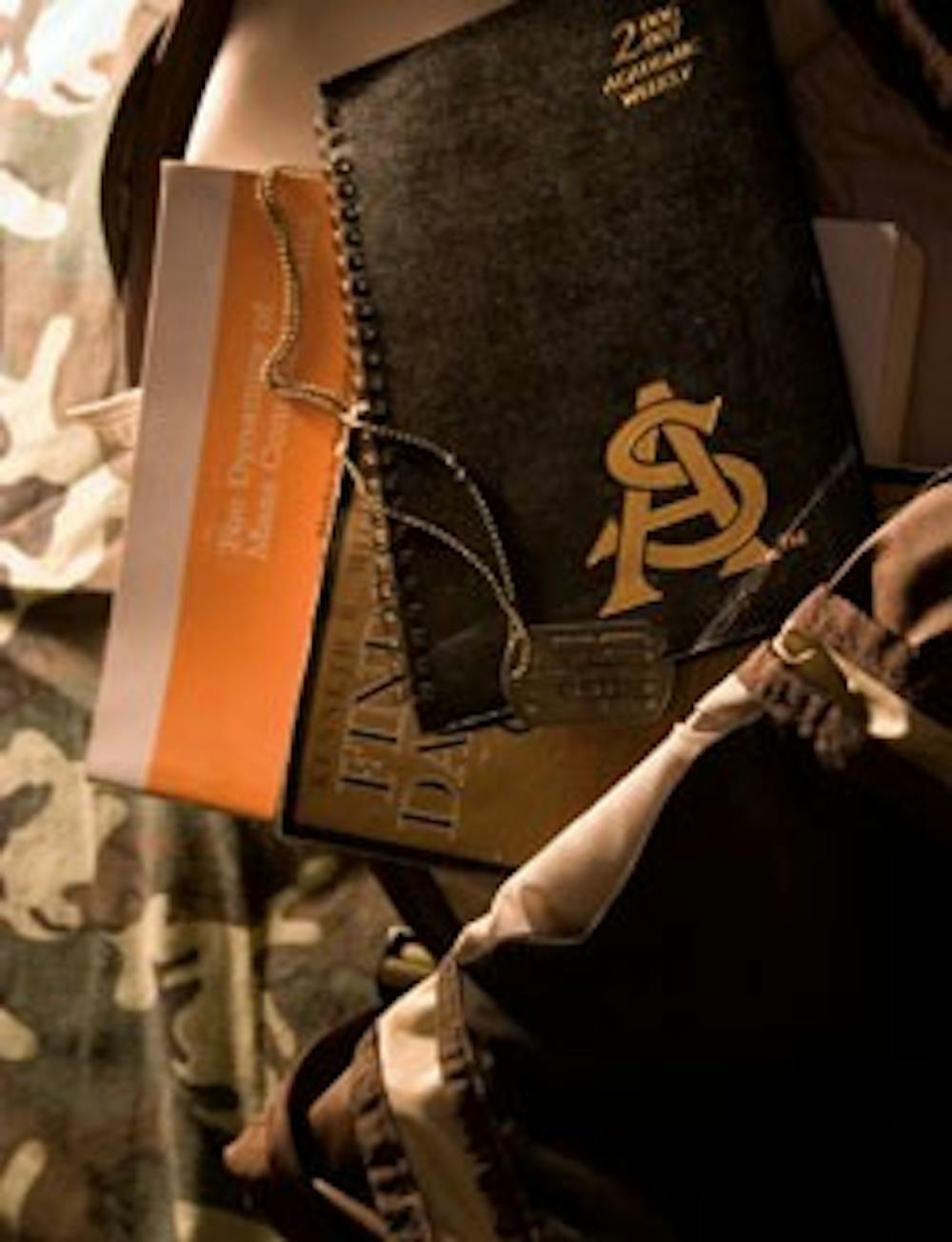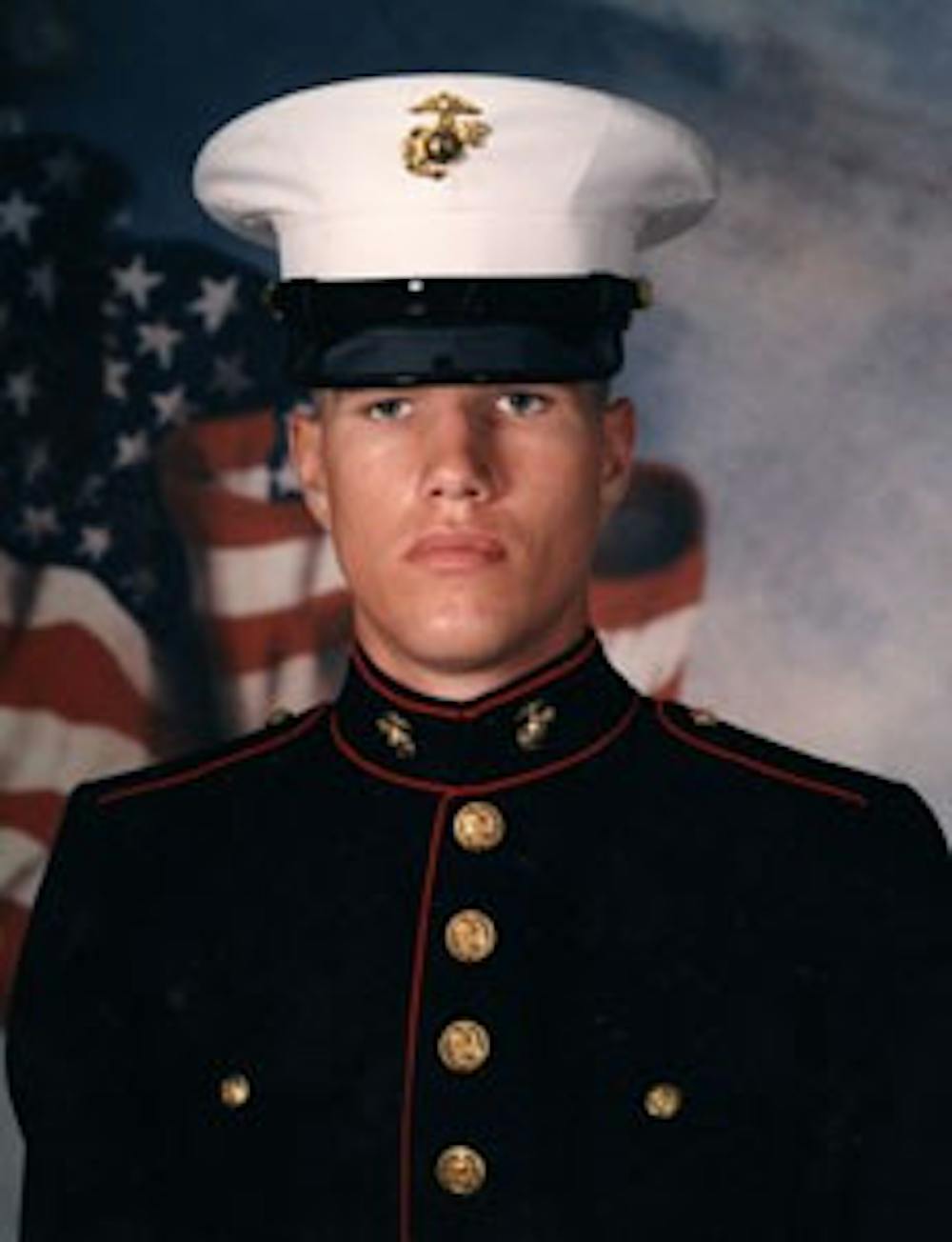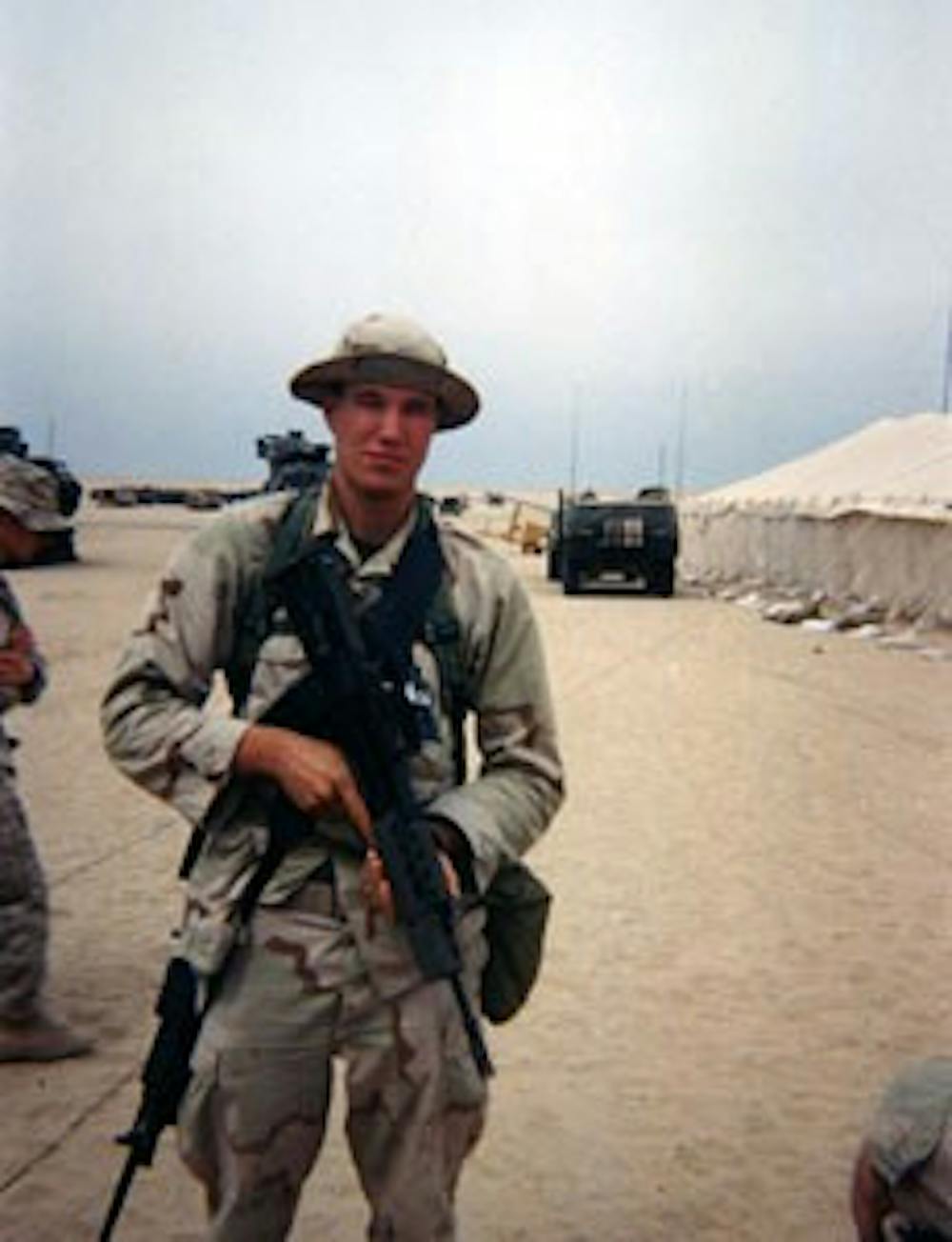"First to fight, last to leave."
One of the slogans of the United States Marine Corps, taken in part from the Marine's Hymn, demonstrates the enduring nature of this military branch: come in early, respond quickly and don't leave till the job is done.
But what happens when a Marine does leave?
Major media outlets report daily the number of Americans killed in the war in Iraq, but often overlook the hundreds of thousands of troops who have come home. Though they've left a dangerous world of sudden combat and shadowy enemies for the static normalcy of U.S. civilian life, Iraq war veterans face other struggles and adjustments.
With more than 3,000 U.S. troops not returning alive from Iraq, SPM looks at three ASU student-Marines who did, three men who love their Marine "brothers," sometimes miss the land where they fought and are ambiguous about what the war means for them.
Though their backgrounds are similar and their stories intersect, in very different ways they've confronted the challenges and opportunities of going from conflict to classroom, of finding how to come home.
Michael
Michael Tobey says he was taken out of the Super Bowl in the first quarter.
Tobey, an infantry lance corporal in the 3rd battalion, 4th Marines, fought in one of the first companies to enter Iraq at the start of the war, but was sidelined after three weeks of combat because of an injury.
"It killed me," the 22-year-old finance junior says. "I was pissed."
His long legs stretch under the Starbucks table in front of him, and when he stands, he towers over other customers. He walks with a slight stiffness largely unnoticeable if you don't know his history.
That history takes him back to April 7, 2003, the day before his unit entered Baghdad and tore down the statue of Saddam Hussein.
While preparing to cross a bridge over the Diyala River into Baghdad, Tobey's unit came under attack.
"The vehicle that was next to me got hit with an artillery round. It got peppered with shrapnel, and a piece of the vehicle came off and broke both my legs," he says in a cautious, unemotional voice. He often simply nods or curtly agrees when responding to questions.
Though the engagement would earn Tobey the Purple Heart, he says he still feels like he has unfinished business, and gets a "tinge of jealousy" when he sees news of soldiers still in the country.
Tobey says daydreaming or watching the news triggers "a gauntlet of emotions" about the Iraq war.
"I'm certainly not a depressed person. I'm living the dream. I've got a wonderful life," he says. "But it strikes me at random times. I'll have quick fleeting moments of depression, guilt, jealousy, anger."
Tobey says that these feelings are completely natural and "certainly don't disrupt [his] life in any way."
But for many people, emotions stemming from the war in Iraq become a "crutch," he says.
"If someone wanted to use that as an excuse to be lazy or get some sympathy, sure that's [a thing] people are comfortable with," Tobey says. "'Oh, he's got PTSD [Post Traumatic Stress Disorder]. He just came back from Iraq. People are just messed up in the head."
The number of broadly-defined cases of psychological problems, depression, anxiety and PTSD, among Marines rises from 20 percent before going to Iraq to 29 percent after, according to a July 2004 report in The New England Journal of Medicine.
Tobey adds that Iraq has changed him. "I do definitely think there's a hole inside of me that's left over in Iraq, but I fill it with other things in my life," he says. "Whether that's my therapy or my way of not having to think about it, that's my decision."
TobeyaO(TM)s hard work has translated into a burgeoning financial-planning business and a financial windfall, enough to buy his mother a new car.
"[Being in the war] just made him grow up and appreciate his family and stuff," says his mother Julie Tobey, speaking over the phone from her home in Montana.
Though the self-described pacifist isn't shy about expressing her opposition to the war, she does say that her son's service in Iraq created positive changes in him.
"I'd probably say that he matured quite a bit. I think war would mature anybody," she says. "He's become quite a man."
She says her son doesn't talk much about the war with her.
"He doesn't dwell on it," she says. "I know he saw some terrible things and he did some things he doesn't talk about. I think that's why he's wrapping himself in work so much, to forget all that," she says.
Part of this desire to succeed stems from knowing some of his other friends didn't come back from Iraq, Tobey says. In addition to the two fellow soldiers killed at the Diyala River bridge, two other friends of his were killed in their second tours of duty.
Tobey says he felt depression and guilt because he wasn't with them, but feels lucky to be alive and inspired to succeed.
"I feel I need to take advantage of what I have because otherwise I'm letting them down," he says. "I'd hate to see them looking down at me laying on a couch feeling sorry for myself and wasting all the opportunities I have."
Bryan
Bryan Flynn, like all Marines, was trained to kill.
Flynn, a sergeant in the support unit that assisted Michael Tobey's unit in the early stages of the Iraq war, didn't see any combat during his eight months of active duty, but returned to the U.S. with fighter training.
"I'm not naturally a violent person, but when you're in that environment for that long, you just read cues," says the recent ASU supply chain management grad. He speaks rapidly, with the precision of a drum cadence.
When he came back to campus, Flynn says he dealt with anger issues, especially when he felt confronted by other "alpha males" on campus.
"He just wants to punch me in the face, and it's really difficult for me to hold back this innate training that wants me to just dismember this person as opposed to punch him in the face," he says.
Flynn says he used the training and discipline he learned as a Marine to temper his instincts, but he was still frustrated by having to shut off this part of himself.
"Now you're just a college student," he says. "You're not in Iraq. You're not doing these things and you have to remove yourself from that mentality that you've so ingrained yourself to."
Flynn also says he was in a constant state of high alert, a trait his mother picked up on as well. Roxanne Flynn says her son's lack of military engagement turned into frustration and anger when he got home.
"I probably cried three times the first two weeks he was home," she says. "He was so abrupt, so intolerant. He was a little explosive, not in a violent way, but maybe in a verbal way."
She says her son's sense of patriotism and purpose grew incredibly during his time in Iraq, but it took him about a month to become acclimated to life back in the United States.
When he first returned, Flynn says he found solace in being with his friends from the military.
"It was like a shift in the balance, balancing the civilian with the military, [and] that can be difficult," he says.
Though he loves the Marines, Flynn didn't support the reasoning behind the war going in. But Flynn says he had to adopt a neutral political view.
"While I didn't agree whatsoever with the deployment and the war because I felt like it was very flawed, when you're in the service, you're apolitical," he says. "You don't have the option of having politics, of having your own personal politics, you follow orders."
Flynn says that upon returning home, some friends suggested he should talk to someone professionally, but he felt that he was simply out of place.
"I didn't think my actions were the problem," he says. "I thought my environment was the problem. I felt maybe I should go back to an environment where this is, you know, the norm, this is the status quo, versus, this [place] where I'm unhappy and I can't relate."
That sense of isolation characterizes many returning veterans, says Pat Tuli, case manager at the Phoenix Veteran's hospital for veterans of Operations Iraqi Freedom and Enduring Freedom.
"Every single one of [their experiences] is different," says Tuli, who has master's degrees in counseling and social work. "Their families report that they're different. They have the stresses from PTSD that manifest themselves in their everyday life."
Further complicating these feelings is a stigma among the military against seeking counseling, Tuli says.
"That's a hard bridge to cross," she says. "The military teaches them to suck it up, and as they do more and more tours, that's harder to do, so we try to make it very easy."
In the same Journal of Medicine study, among troops who met screening criteria for mental disorders, the most common perceived barriers to treatment were the fear of being "seen as weak" (65 percent), followed closely by being treated differently by unit leadership (63 percent) or other soldiers having less confidence in them (59 percent).
The Veteran's Hospital offers counseling, group sessions, family and spousal support and general care, Tuli says.
Flynn says that he was introspective person, and with time, he was able to sort through his feelings on his own.
"I just talked to some close friends and worked out my problems and I think I'm very well-adjusted now," he says.
"To move on personally, you have to let stuff go," he adds. "There's always going to be something there, some things, if I think back on them, [that] frustrate the hell out of me. But I think more of the good memories than the bad memories stand out in my mind."
Chris
In his years with the Marines, Chris Sheppard has fluctuated between flight and fight.
In a three and a half year period, Sheppard served two tours of duty in Iraq, one as a specialist leading Brian Flynn's Bulk Fuel Co. C, and the other as executive officer for Combat Service Support Co. 113 . He's lived in 40 different locations in four countries.
"I was in a constant state of flux," the fourth-year mass communication graduate student says. "It is lonely, because you're the only one that really knows what's going on in your head. Your experience is unique. Not a lot of people are going to relate to it."
Dressed in a simple gray ASU sweatshirt and with stubble skirting the chin of his round face, Sheppard looks down-to-earth. His style of speech punctuated with idioms and "you know?"s matches well.
Fighting in major combat operations when Saddam was in power and then fighting the insurgency on his second tour was like fighting "two completely different wars," Sheppard says.
While on his second tour, Sheppard's company was engaged in the Battle for Fallujah, the largest urban battle since the Vietnam War, and four of his men were killed in one day. As a commanding officer, Sheppard says it was his job to write letters of condolence to the soldiers' parents, an experience he calls "humbling."
One thing that Sheppard says didn't affect him was the knowledge that he might have killed enemy fighters.
"I was probably responsible for killing 15 to 30 people," he says. "I had absolutely no guilt or remorse about that because they were trying to kill me and my guys."
On his returns from combat, Sheppard says he struggled with the realization that the world had continued without him while he was away.
"You have to reattach yourself, and sometimes that's kind of a painful process because you don't quite know how to do it," he says. "You just stumble around and figure it out. You may have had old friends; now they kind of disappeared. You go out and make new friends. You have family members that maybe you've gotten closer to and maybe you've gotten more distant from, and you just deal with it. There's nothing else you can do."
Sheppard also says at home, he missed the sense of importance he experienced during the war.
"In Iraq, I was pivotal to a lot of people, and you get used to being of higher value, like your opinion counted, your decision counted. Here, back in the States, the only person you're really in charge of is yourself," he says.
Sheppard says traveling was therapeutic and a chance to challenge himself again.
"By traveling, I was able to throw myself into situations that were, a lot of times, beyond my control and I had to think on my feet all the time, so that's what I really enjoyed about it," he says.
He went to Brazil, where he'd stayed briefly during his first tour of duty, two days after returning to the U.S. from his second tour. Working as a volunteer English teacher there, Sheppard felt like he made more of a difference than he did in Iraq.
But Sheppard says he knew that his time in Brazil, which he calls a great "exercise in escapism," was only temporary, and after four months, he returned to the U.S.
"By going down to someplace like Rio, you can choose to make that your reality, but in a sense you're running away from your own reality back here. I made a decision that I'm going to come back," he says.
But by March, Sheppard says he was frustrated and bored with a "very bland and vanilla" life in the U.S. He headed to Columbia, a country where he knew no one and didn't speak the language. He stayed until June.
Sheppard is now writing his thesis and working at ASU's New Media Innovation lab, but says he still goes through phases where he wants to go back to Iraq. He misses the camaraderie of his fellow Marines and the intellectual stimulation of being an officer.
"It really engaged every bit of your brain," Sheppard says. "There's nothing that's left out of the equation. It's kind of hard to describe that to somebody that hasn't really been in that situation. It's like everything's flipped on at once," he adds.
Sheppard recognizes that there are some things, such as a strong sense of trust, that he's lost. But he also grew in positive ways. "I took over some naA'vetA(c) and some immaturity, and it died in the sand out there," he says.
He says he also gained a sense that humans have less control over their destinies than he previously thought.
"Lots of times [people] are parts of events that are just far bigger than themselves," he says. "A lot of life is luck and chance, and that helped me to realize that you can savor the good stuff, too, because you don't know if it's going to end. Things don't always get better, things can get far worse."
But, overall, Sheppard thinks the experience was positive, and gave him a better view of the world "as it really is."
"The world is like [philosopher Thomas] Hobbes described it: It's brutish, nasty and short. It's very unforgiving. And when people are able to rise above that and build things, and do positive things, you tend to appreciate that a lot more, because you realize how fragile that is."
Reach the reporter at: james.kindle@asu.edu.






